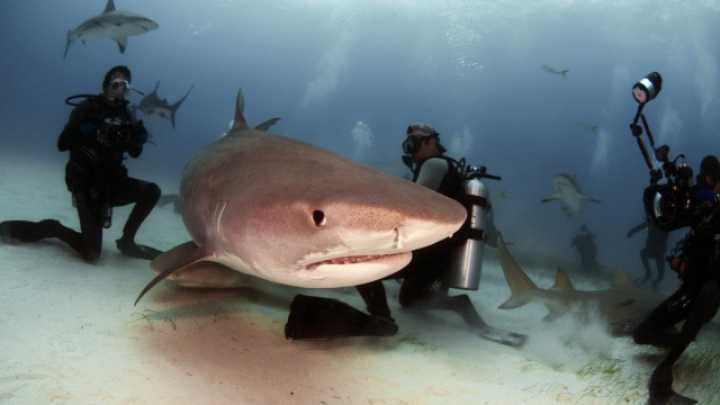
Imagine going to the beach and seeing a curious shark swimming nearby. You might wonder what it would be like to interact with such a majestic creature. Can it actually be safe to swim with sharks? Let’s dive into this topic together, exploring how humans can interact safely with sharks and debunking some myths along the way.
Understanding Shark Behavior
Every species of shark has its unique characteristics and behavior. Some are more aggressive than others, while many are surprisingly docile. For instance, the whale shark, a gentle giant, poses no threat to humans. These sharks filter-feed on plankton, making them harmless swimmers alongside divers. On the other hand, species like the great white or tiger shark might be more unpredictable.
So, what influences shark behavior? Most sharks are curious creatures. When they encounter humans, they might investigate, but that doesn’t mean they want to attack. Most bites happen because a shark mistakes a person for its usual prey. Think of it like how a dog might sniff at someone new. They’re not necessarily aggressive; they’re just trying to understand what’s going on.
Awareness of these behaviors can help humans know how to interact safely with sharks. By educating ourselves, we can reduce the chances of misunderstandings during encounters.
Safety Tips for Swimming with Sharks
If you’re thinking of getting in the water where sharks swim, there are some important safety tips to keep in mind. Here are a few to help ensure your experience is both thrilling and safe:
- Choose the Right Location: Some areas are known for being shark-friendly, and others not so much. Look for regions where shark diving is common and guided by professionals.
- Follow Guidelines: Pay attention to the safety briefings provided by guides. They know the sharks in the area and will instruct you on how to behave.
- Avoid Splashing: Excessive splashing can attract sharks. Try to be calm and smooth in the water.
- Don’t Wear Shiny Jewelry: Just like it does with fish, shiny objects can grab a shark’s attention. Leave the bling on land!
By following these tips, you can enjoy your adventure while minimizing risk. More often than not, being smart about your choices will set you up for a memorable experience.
Shark Diving: A Thrilling Experience
Shark diving has become a popular adventure for thrill-seekers. Imagine descending into the deep blue sea, surrounded by these incredible creatures. Sounds amazing, right? But what can you expect on a shark diving trip?
First, you’ll likely go through a briefing where experts explain what to expect. They’ll cover everything from shark behavior to how to use the gear properly. Using a diving cage is common for those who want an extra layer of safety. This way, you can observe sharks without directly interacting with them.
While underwater, you might feel a mix of fear and excitement. Honestly, it’s normal! Sharks often swim closer than you’d expect. But remember, they’re just doing their thing. Remaining calm is important, and staying still will help you enjoy the view without alarming the sharks.
Myths About Sharks: What’s True and What’s Not
Sharks have been misunderstood for years, leading to many myths. Let’s bust a few common ones:
- Myth: All sharks are dangerous. Not true! Many species, like the nurse shark, are quite gentle.
- Myth: Sharks can smell blood from miles away. While they do have a keen sense of smell, it’s more likely they’ll sense it from a few hundred yards, not miles.
- Myth: Sharks are mindless killing machines. Sharks are smart. They often approach humans out of curiosity, not aggression.
By debunking these myths, we gain a better appreciation for sharks and their role in the ecosystem. It’s essential to separate fact from fiction to foster a healthy respect for these animals.
The Role of Sharks in the Ecosystem
Sharks are vital to our oceans and contribute to the health of marine ecosystems. They’re often referred to as *apex predators*, meaning they help keep populations of other species in check. When sharks thrive, it indicates a healthy ocean environment.
When a species is hunted, the balance of the ecosystem can shift dramatically. For example, if shark numbers decline, their prey may grow too numerous. This can lead to overgrazing of seagrasses and coral reefs, which are crucial habitats for many marine animals. So, protecting sharks doesn’t just benefit them; it helps keep the whole ocean ecosystem healthy.
Understanding this role can help people appreciate the importance of sharks, making interaction with them more meaningful and responsible.
Conservation Efforts and How You Can Help
Despite their importance, sharks are in trouble. Many species are threatened due to overfishing, habitat loss, and climate change. Conservation efforts are crucial for their survival, and every little bit helps.
You might be wondering how you can contribute. Here are a few ideas:
- Support Sustainable Seafood: Choose seafood sourced from sustainable fisheries that don’t harm shark populations.
- Educate Others: Share what you learn about sharks with friends and family. Awareness can lead to change.
- Participate in Beach Cleanups: Clean oceans lead to healthier habitats for sharks and their prey.
By getting involved, you help create a world where sharks can thrive alongside humans in the ocean.
In summary, humans can interact safely with sharks, provided they take the right precautions and approach with respect. Understanding shark behavior, following safety tips, and debunking myths are all steps towards a safer, more informed experience.
As you consider diving into the water for a thrilling encounter, remember that sharks are more than just creatures of fear; they’re essential players in the health of our oceans. By respecting them and supporting conservation, we can enjoy the beauty of these magnificent animals while ensuring they continue to thrive for generations to come. So, if you’re ready for the adventure of a lifetime, dive in—just do it safely!

